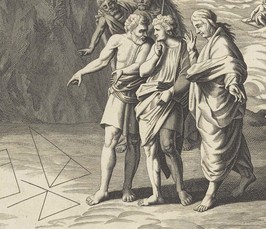Marks in the Sand: Abstraction, Aesthetics, and the Definition of the Human
Research Seminar
- Data: 05.03.2019
- Ora: 11:00
- Relatrice: Rebecca Zorach

For Vitruvius, this exemplum gave evidence for the idea that knowledge can be preserved when all else is lost. Kant cited this anecdote as a way of establishing a division between art and nature. Montesquieu put it to more political uses. An illustration of the story was used as the frontispiece of several eighteenth-century texts on geometry. This talk will address the permutations of this story found in the works of these Enlightenment writers and others—in the context not only of the European Republic of Letters but also the early modern colonial encounter and modern literary criticism. Alongside questions of the definition of the human, they implicate a series of abstractions revolving around mathematics, money, religion, and loss.
Scientific Organization: David Zagoury
Rebecca Zorach teaches and writes on early modern European art, contemporary activist art, and art of the 1960s and 1970s. Particular interests include print media, feminist and queer theory, theory of representation, the Black Arts Movement, and the multiple intersections of art and politics. She is the author of Blood, Milk, Ink, Gold: Abundance and Excess in the French Renaissance (Chicago 2005) and The Passionate Triangle (Chicago 2011) of the forthcoming Art for People's Sake: Artists, Community, and Black Chicago 1965–75 (Duke 2019).